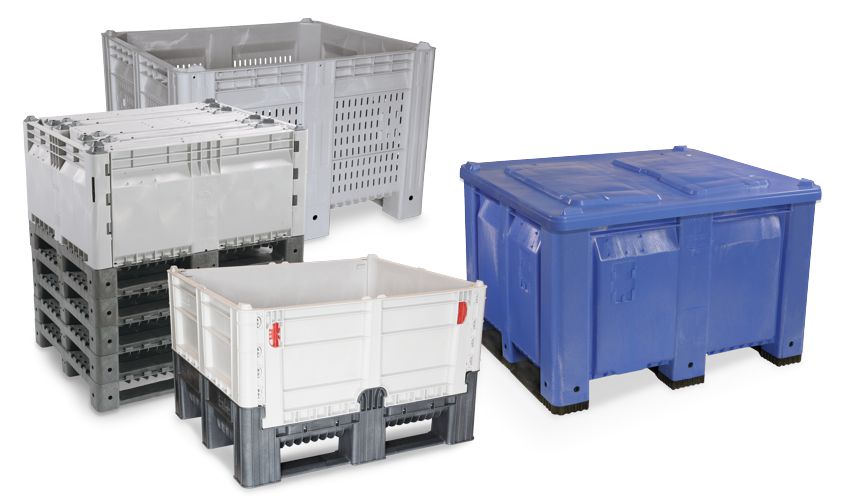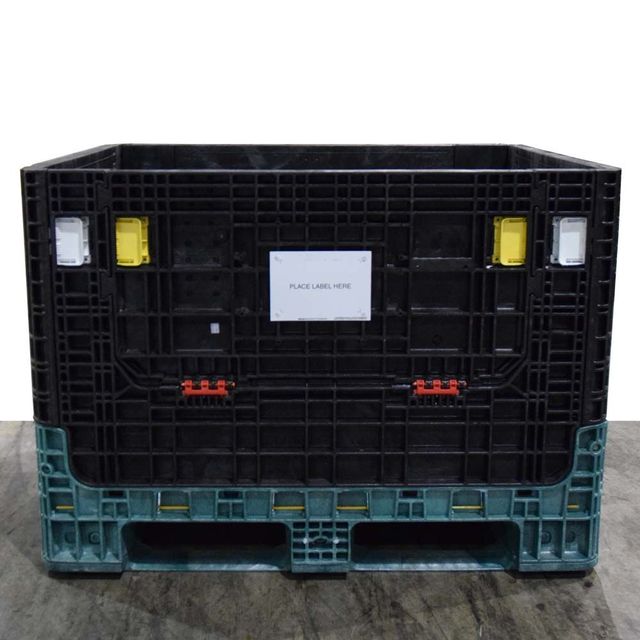Learn why refurbished bulk containers are preferred by logistics and storage experts
Wiki Article
Why Bulk Containers Are Vital for Cost-efficient and lasting Transportation
Mass containers play a crucial function in modern logistics. They facilitate the reliable motion of huge amounts of goods, therefore enhancing transportation procedures. This method not just reduces expenses yet also decreases ecological impact via reduced emissions and waste generation. As markets look for more lasting techniques, the adoption of mass containers is ending up being significantly considerable. What effects does this change hold for future logistics and supply chain administration?
The Benefits of Utilizing Bulk Containers in Logistics
Bulk containers revolutionize logistics by boosting performance and sustainability. These containers enable the transport of large quantities of items in a single journey, markedly lowering the variety of journeys needed. This not just simplifies operations but also minimizes labor prices connected with handling, packing, and discharging. On top of that, bulk containers are created to enhance room application within transportation cars, ensuring that even more products can be shipped all at once.The standardization of mass containers also simplifies the logistics process. With consistent dimensions, they can be conveniently stacked and stored, causing improved warehouse monitoring. Furthermore, mass containers commonly include long lasting materials that shield components from damage throughout transit, thereby reducing product loss and raising general integrity. As a result, services can experience boosted supply chain performance, ultimately causing increased success and client complete satisfaction. This mix of variables makes mass containers a vital property in modern logistics.
Ecological Influence: Reducing Waste and Carbon Footprint
As sectors significantly prioritize sustainability, the adoption of mass containers has actually become an essential method for lowering waste and lowering carbon footprints. These containers lessen making use of product packaging materials, such as boxes and plastic, thus significantly decreasing overall waste generation. By combining deliveries, mass containers boost transport performance, enabling more products to be transferred per trip. This reduction in trips directly correlates with lower greenhouse gas emissions, contributing to a smaller carbon footprint.Bulk containers can frequently be recycled or reused, further mitigating environmental influence. The resilience of these containers guarantees they can withstand multiple transportation cycles, lowering the demand for single-use alternatives. used bulk containers. By improving logistics and promoting reliable source use, bulk containers not just support lasting techniques yet likewise motivate industries to align with global ecological goals. Ultimately, their execution shows a commitment to ecological stewardship and liable source management
Price Financial Savings: Exactly How Bulk Containers Lower Transportation Expenses
While many firms look for methods to enhance their profits, the usage of bulk containers presents a considerable opportunity for decreasing transportation expenditures. Bulk containers maximize the quantity of goods moved, permitting services to ship bigger amounts at when. This efficiency reduces the variety of trips called for, directly decreasing gas costs and lessening labor expenses related to loading and dumping.Furthermore, mass containers frequently include streamlined designs that maximize space use within transport automobiles. This means less voids, causing more reliable use available capability. The toughness of mass containers can lower the risk of product damage during transit, minimizing losses and making certain that even more items get here undamaged.
Enhancing Supply Chain Performance With Mass Storage Solutions
Bulk storage options play a vital function in boosting supply chain performance by optimizing inventory management. By combining goods into less, bigger containers, services can considerably lower taking care of prices related to constant transfers and handling. This structured technique permits for much better tracking and management of supply, inevitably leading to improved operational performance.Streamlined Stock Administration
Efficient stock administration is vital for enhancing supply chain operations, particularly when companies take on bulk storage space remedies. These services enable businesses to maintain greater supply degrees while lessening the frequency of replenishment. By consolidating products into bulk containers, firms can enhance their stock processes, lowering the complexity associated with tracking numerous smaller sized packages. This strategy assists in exact stock counts and enhances forecasting precision, allowing for even more informed decision-making. In enhancement, bulk storage space services streamline warehouse company, making it simpler to situate and gain access to products when required. Therefore, organizations can attain a much more efficient supply turn over rate, inevitably improving total supply chain performance and lowering the possibility of stockouts or overstock scenarios.
Decreased Handling Expenses
The execution of bulk storage space solutions not just streamlines stock monitoring but additionally considerably minimizes taking care of prices across the supply chain. By consolidating materials right into bulk containers, companies reduce the demand for constant handling and transfer between different storage space and transport units. This method minimizes labor expenses related to loading, dumping, and relocating smaller packages. Additionally, bulk storage reduces the frequency of deliveries, bring about reduced transport prices and lowered fuel consumption. As a result, services can maximize their logistics procedures, enabling a more effective allowance of resources. Ultimately, reduced handling expenses contribute to improved general supply chain performance, promoting an atmosphere that supports both sustainability and economic viability.
Adaptability of Mass Containers Throughout Various Industries
Numerous sectors have distinctive demands for transport and storage space, mass containers have actually arised as a versatile solution that fulfills a broad array of requirements. These containers, varying from big bins to specialized tanks, can accommodate diverse materials, consisting of powders, granules, and fluids. In the agricultural market, mass containers promote the transport of plant foods and grains, while the food and beverage market uses them for active ingredients and finished products. The chemical industry relies on bulk containers for securely transporting hazardous materials, guaranteeing conformity with security laws. In addition, building and construction firms benefit from bulk containers for carrying accumulations and various other materials. Their versatility prolongs to various settings of transportation, consisting of ships, trains, and vehicles, improving logistical performance. This adaptability not only streamlines procedures across different markets but additionally promotes sustainability by lowering product packaging waste and enhancing space in transit. Mass containers play a necessary duty in modern supply chain management.Future Trends wholesale Container Usage and Sustainability
The future of bulk container usage is used bulk containers progressively formed by innovative products development that enhances sustainability. In addition, automation in logistics assures to simplify operations, reducing waste and boosting performance. Accepting round economy practices will further transform exactly how bulk containers are designed, made use of, and reused, fostering a much more sustainable transport landscape.Ingenious Products Development
As markets increasingly focus on sustainability, cutting-edge materials development in bulk containers becomes a substantial consider boosting eco-friendly transportation options. Researchers and producers are exploring naturally degradable plastics, recycled composites, and light-weight steels to minimize ecological impact. These materials not only decrease waste but likewise improve gas efficiency by lowering the overall weight of containers. Additionally, developments in wise materials, which can adapt to varying conditions, enhance the toughness and performance of mass containers. The integration of these cutting-edge materials straightens with circular economic situation concepts, promoting reuse and recycling. As the need for sustainable techniques expands, the advancement of such products will certainly play a crucial role in forming the future of bulk container use in logistics and transportation.Automation in Logistics
Substantial developments in automation are positioned to change logistics and the usage of mass containers, improving sustainability in transportation. Automated systems, including drones and independent lorries, are improving the movement of mass containers, minimizing the dependence on typical fuel-powered transport. These modern technologies optimize transmitting and filling processes, lessening vacant miles and improving fuel effectiveness. Additionally, automated inventory monitoring systems boost monitoring and monitoring of mass containers, ensuring far better source allocation and decreased waste. The assimilation of the Web of Things (IoT) allows real-time data evaluation, allowing proactive decision-making that straightens with sustainability objectives. As automation proceeds to progress, it is anticipated to drive further developments in bulk container use, eventually sustaining more sustainable logistics practices and decreasing the ecological impact of transportation.Circular Economy Practices
Improvements in automation are establishing the stage for a more incorporated approach to circular economic situation methods in the domain name of bulk container usage. As industries significantly welcome sustainability, bulk containers are being developed for long life and reusability. This change not only decreases waste but likewise enhances resource effectiveness. Companies are taking on strategies such as closed-loop systems, where utilized containers are collected, refurbished, and reintroduced right into the supply chain. Furthermore, smart modern technologies track container life cycles, facilitating much better management and reducing ecological influence. The cooperation in between producers, logistics carriers, and end-users is essential in developing requirements for sustainable container usage. refurbished bulk containers. Future trends indicate a growing emphasis on products that are naturally degradable and recyclable, additional enhancing the round economy's concepts in mass transport
Often Asked Questions
What Materials Are Bulk Containers Typically Made From?
Mass containers are typically built from sturdy materials such as high-density polyethylene, cardboard, steel, and light weight aluminum. These products give adaptability, stamina, and security, making them suitable for carrying various items in different industries efficiently.Just how Do I Pick the Right Size Mass Container?
Picking the appropriate dimension bulk container involves reviewing the volume of materials to be carried, taking into consideration taking care of equipment compatibility, and evaluating storage room demands. Proper dimension guarantees performance in transport and minimizes waste during delivery.Are Bulk Containers Reusable or Recyclable?
Mass containers are commonly multiple-use, made for multiple trips, improving sustainability. Numerous can also be reused, relying on the materials utilized. Selecting recyclable choices further minimizes and sustains environmental goals waste in transportation methods.What Safety And Security Regulations Put On Mass Container Transport?
Safety and security laws for bulk container transport include conformity with the Department of Transport guidelines, proper labeling of dangerous materials, structural integrity assessments, and adherence to weight limits to guarantee risk-free handling and protect against accidents during transportation.How Can Organizations Transition to Making Use Of Bulk Containers Successfully?
Companies can transform to bulk containers by examining present logistics, educating personnel on handling, investing in suitable devices, enhancing supply monitoring, and collaborating with suppliers to assure compatibility and effectiveness throughout the supply chain.
As markets progressively prioritize sustainability, the adoption of mass containers has arised as a crucial approach for minimizing waste and decreasing carbon impacts. By consolidating products right into mass containers, firms can improve their stock processes, minimizing the intricacy linked with tracking several smaller packages. As sectors significantly focus on sustainability, cutting-edge products development in bulk containers emerges as a significant factor in improving environment-friendly transportation services. Automated systems, consisting of drones and independent automobiles, are improving the motion of mass containers, decreasing the dependence on standard fuel-powered transport. Additionally, automated supply management systems boost monitoring and monitoring of mass containers, guaranteeing far better source allocation and decreased waste.
Report this wiki page